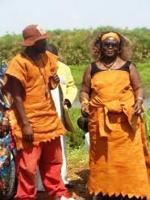Kenya Health Care Matters
f you are travelling to Kenya, you should first consult your doctor about Kenya Health Care Matters - but if you haven’t, allow us to give you a hint of what you should put into consideration as far as health matters in Kenya is concerned.
You should consult with your doctor to decide which medications or inoculations are necessary for a safe visit to Kenya, many vaccines requires more than one dose, to seek advice on immunization some weeks before your departure is a good idea.
The risk of an infection depends of the areas and conditions under which you will be travelling, in Kenya exists malaria risk all year round, more around some areas of Mombasa and the lower coast, however, taking the appropriate precautions, visit Kenya is very safe.
You must protect yourself from the equatorial sun, stay well hydrated, and use mosquito repellent wherever is possible.
If you are travelling directly from the U.S. or Europe, immunizations are not required, if you travel from an area where yellow fever is present, you will need to present a certificate of vaccination, you should be, also, up to date with your polio and tetanus vaccinations.
The best prevention against malaria, dengue fever, rift valley fever, chikungunya fever, is to protect ourselves against bites from insect-borne diseases. Exists risks of catch hepatitis A, B and E, diarrhoeal diseases and Cholera, AIDS prevalence is declining but still is a serious problem in Kenya, you should take the necessary precautions.
Immunization for travelers against the next diseases are usually recommended:
•Yellow Fever
•Hepatitis A
•Hepatitis B
•Typhoid
•Polio
•Tetanus
•Measles
•Rabies
•Meningitis
•Diphtheria
Medicine Bag
You will travel with a small first aid kit that includes Band-Aids, thermometer, sun block, oral re-hydration sachets, anti-diarrhoeal medication, antiseptics, water purification tablets and more.
Food And Drink
Visitors are advised to be careful of what are eating and drinking, There are water of variable quality; in main cities is normally safe, outside main cities is likely to be contaminated you must to purify it by boiling or using a water purifier; but is preferable to drink bottled water,
Poultry, meat, pasteurized milk, fruits and vegetables are considered in general safe to eat, you must be sure that these products has been carefully cleaned and washed, you must avoid anything that has been re-heated or left exposed to flies, this include food prepared by un-licensed vendors, always choose freshly cooked food.
Diseases in Kenya
HIV/AIDS
AIDS is a serious disease, you must take the necessary precautions. Some international travelers are endangered if they have sexual contact with potentially infected people, condoms are widely available and relatively inexpensive, used properly, have proved to be effective reducing the risk of transmission of HIV and other sexually transmitted infections.
Medical injections, blood supply are also a possible source, if is necessary a injection, the traveler should be sure that the medical instrument have been sterilized properly. If you want a tattoo, piercing or something like that, must be sure that the instruments used have been sterilized.
There is no risk of acquire HIV from casual contact or sharing means of transport with infected individuals, there is also no evidence that HIV can be acquired from insect bites.
CHOLERA
This diarrhoeal disease is caused by toxigenic Vibrio cholerae O-group 1 or O-group 139, can cause rapid dehydration and death, reports of this disease are periodical in Kenya, the most recent cases were in West Pokot and Turkana in April-May 2007, in the country border with Uganda.
Cholera exists where standards of environmental hygiene are low, the infection is related to contaminated water or food, person-to-person transmission is rare and most travelers are at extremely low risk for infection, but they should be very careful about the food and water.
DENGUE FEVER
Dengue fever is a viral infection transmitted by the Aedes Aegypti mosquito, which bite preferably during daytime, its symptoms includes fever, muscle aches, headaches, nausea, vomiting, there is no direct person-to-person transmission. Dengue is common in densely populated areas, specially in tropical or subtropical countries.
There is no vaccine at this time, in areas where dengue occurs, travelers should take their precautions to avoid mosquito bites both during the day and at night, wearing clothing that covers the arms and legs, and applying insect repellent.
Kenya Health Care Matters with Malaria
Malaria is a disease spread by infected female Anopheles mosquitoes, that bite mainly at dusk and at night, occasionally, transmission occurs by blood transfusion. Malaria epidemics mainly occurs during rainy seasons and its symptoms includes fever, chills, sweating, headache, diarrhoea, abdominal pains.
Before your trip, your doctor should prescribe to you the correct anti-malarial medication. In Kenya, insect protection measures are essential, travelers must prevent mosquito bites at all times, visitors should wear light-coloured clothes, long trousers, avoid the use of perfumes, use mosquito repellents and take antimalarial medication.
If medical care is not accessible, malaria tablets can be used, without treatment malaria can quickly become more serious, this disease can be fatal.
YELLOW FEVER
Yellow fever is a mosquito-borne viral disease, that infects humans and monkeys, in forest and jungle areas, monkeys are the main reservoir of infection, in urban areas, infection is transmitted among humans by mosquitoes. The risk is lower in the areas of Mombasa and Naoribi than other areas
Symptoms of yellow fever are variable and include fever, headache, muscle pains, abdominal pain and vomiting, yellowing of your skin and the whites of your eyes, travelers are at risk in all areas where yellow fever is endemic. There is an effective vaccine against yellow fever, this is recommended for all travelers and must be administered at an approved yellow fever vaccination center, you must seek medical treatment if you think you have yellow fever.
TYPHOID
Typhoid is caused by a type of salmonella bacteria, Salmonella typhi, which infects only humans. Known as enteric fever, this disease is transmitted via consumption of contaminated food and water, the best is to be cautious about eating fresh vegetables
Symptoms include fever, headache, loss of appetite and general malaise other symptoms are constipation and stomach pains. The mainstay of treatment are an injectable polysaccharide vaccine or antibiotics in capsules, is important also a re-hydration therapy if diarrhoea has been a characteristic of the illness.
Other Related Pages
Entertainment and Nightlife Shopping Guide Hotels and Lodges Restaurants and DiningRecent Articles
-
Garam Masala Appetizers ,How to Make Garam Masala,Kenya Cuisines
Sep 21, 14 03:38 PM
Garam Masala Appetizers are originally Indian food but of recent, many Kenyans use it. Therefore, on this site, we will guide you on how to make it easily. -
The Details of the Baruuli-Banyara People and their Culture in Uganda
Sep 03, 14 12:32 AM
The Baruuli-Banyala are a people of Central Uganda who generally live near the Nile River-Lake Kyoga basin. -
Guide to Nubi People and their Culture in Kenya and Uganda
Sep 03, 14 12:24 AM
The Nubians consist of seven non-Arab Muslim tribes which originated in the Nubia region, an area between Aswan in southern







New! Comments
Have your say about what you just read! Leave me a comment in the box below.